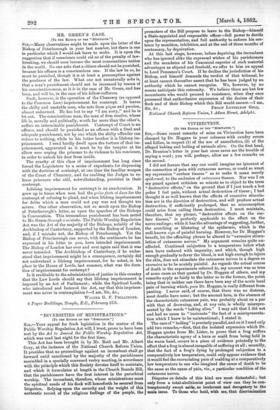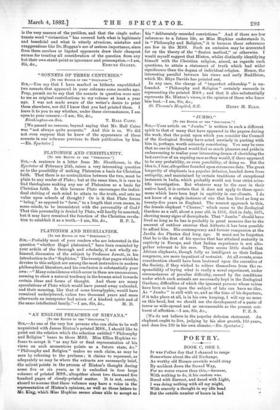VIVISECTION.
[TO THE EDITOR OF TH8 " SPECTATOR."] Sra,—Some recent remarks of mine on Vivisection have been charged by Dr. Hoggan in your columns with sundry errors and follies, in respect (1) of the use of anaesthetics, (2) of the alleged baking and boiling of animals alive. On the first head, Dr. Brunton's letter in your last issue saves me the trouble of saying a word; you will, perhaps, allow me a few remarks on the second. - I did not foresee that any one could imagine me ignorant of the connection of pain with cutaneous nerves, or could so wrest my expression " surface tissues" as to make it mean merely epidermal, to the exclusion of cutaneous tissues. Nor was I on my guard against criticism so minute as to object to the term "destructive effects," on the ground that if I just touch a hot poker I feel pain, without actual destruction of tissue ; I had thought it so well known that the effects of excessive stimula- tion are in the direction of destruction, and will produce actual destruction, if sufficiently prolonged, that no misconception could arise from calling them destructive. I must maintain, therefore, that my phrase, " destructive effects on the, sur- face tissues," is perfectly applicable to the effect on the nerve-endings ; while it has the advantage of suggesting, further, the scorching or blistering of the epidermis, which is the well-known sign of painful burning. However, for Dr. Hoggan's benefit, let the offending phrase be altered to "excessive stimu- lation of cutaneous nerves." My argument remains quite un- affected. Continued subjection to a temperature below what men have endured with impunity, and which, though high enough gradually to fever the blood, is not high enough to injure the skin, does not stimulate the cutaneous nerves in a degree so excessive as to be acutely painful. As regards the actual course of death in the experiments referred to, my account was as true of some cases as that quoted by Dr. Hoggan of others, and my remarks apply as fairly to the latter as to the former, the point being that in neither can there have been any of the acute local pain of burning which, pace Dr. Hoggan, is really different from panting. I never said, of course, that there was no distress, most deaths have some; but the amount here, in the absence of the characteristic cutaneous pain, was probably about on a par with that of drowning, and, at any rate, is wholly misrepre- sented by the words "baking alive." I may add that I did not and had no cause to " insinuate " the fact of a misrepresenta- tion which I knew to be unintentional ; I stated it.
The case of " boiling" is precisely parallel, and on it I need only add two remarks,—first, that the isolated expression which Dr. Hoggan quotes from Mr. Lister, to prove that a frog suffers the characteristic agony of a burn or scald from being held in the warm hand, occurs in a piece of evidence pointedly to the effect that a frog is almost incapable of suffering at all ; secondly., that the fact of a frog's dying by prolonged subjection to a comparatively low temperature, could only appear evidence that it would feel the excruciating pain of scalding at a comparatively low temperature to one who imagined the cause of death to be the same as the cause of pain, viz., a particular condition of the cutaneous nerves.
Disputes on details of this kind are most distasteful ; but only from a total-abolitionist point of view can they be con- temptuously swept aside, as irrelevant and derogatory to the main issue. To those who hold, with me, that discrimination is the very essence of the problem, and that the single unfor- tunate word " vivisection " has covered both what is legitimate and beneficial and what is utterly atrocious, mistakes and exaggerations like Dr. Hoggan's are of serious importance, since from them careless or bigoted opponents draw their cheapest excuse for treating all consideration of the question from any but their own stand-point as ignorance and presumption.—I am,



































 Previous page
Previous page